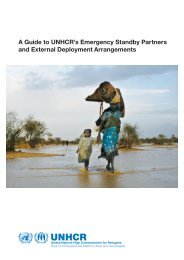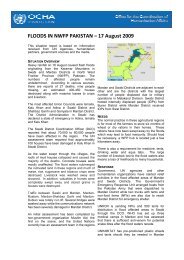Advocacy and resource mobilisation - OneResponse
Advocacy and resource mobilisation - OneResponse
Advocacy and resource mobilisation - OneResponse
Create successful ePaper yourself
Turn your PDF publications into a flip-book with our unique Google optimized e-Paper software.
Funding for cluster coordination<br />
In accordance with the Inter-Agency<br />
St<strong>and</strong>ing Committee (IASC) decision<br />
in July 2009, funding for national<strong>and</strong><br />
sub-national-level cluster<br />
coordination should be included in all<br />
Flash Appeals <strong>and</strong> Consolidated<br />
Appeals. The following guidelines<br />
generally apply:<br />
� Make provision for cluster<br />
�<br />
coordination as a st<strong>and</strong>-alone<br />
project.<br />
Include the provision in the<br />
emergency education section of<br />
the Appeal.<br />
� Narrative for the proposal can<br />
be drawn from the ToR for<br />
Cluster/Sector Leads at Country<br />
Level (see section 2.2).<br />
<strong>Advocacy</strong> <strong>and</strong> <strong>resource</strong> <strong>mobilisation</strong><br />
Managing cluster coordination<br />
funding<br />
In addition to budgeting for cluster<br />
coordination costs, early provision will<br />
need to be made for how allocated<br />
funding will be managed.<br />
As the cluster is not an ‘organisation’, it<br />
cannot receive funding, therefore<br />
arrangements will have to be made with<br />
the CLA(s) or another cluster partner<br />
agency for channelling the funding<br />
through them.<br />
This may involve a contract agreement<br />
between the donor <strong>and</strong> this cluster<br />
partner, which would ultimately take<br />
responsibility for managing, <strong>and</strong> reporting<br />
on, the disbursement of the funds.<br />
� There is no generic budget – draw guidance from previous CAPs.<br />
Arguments to support funding coordination include cluster coordination as a<br />
common service, <strong>and</strong> the need for dedicated coordination capacity.<br />
Typical costs might include: coordination staff, office <strong>and</strong> meeting costs,<br />
information management (IM), joint needs assessment costs, transport,<br />
communications <strong>and</strong> advocacy, training <strong>and</strong> capacity development.<br />
Prioritising projects for inclusion in funding appeals<br />
As information about cluster partner funding becomes available, the Coordinator<br />
will need to take steps to identify the most critical <strong>and</strong> under-funded education<br />
needs for which funding has not already been committed. A process of selection<br />
may then be required, to determine which projects will be included by the cluster<br />
in pooled funding appeals, <strong>and</strong> which will be identified as the cluster’s priority<br />
projects.<br />
Selection of cluster projects can be a sensitive process, particularly when projects<br />
proposed by the CLA(s) are also under consideration. Furthermore, some cluster<br />
partners will be unfamiliar with the restrictions <strong>and</strong> criteria for funding.<br />
An inclusive <strong>and</strong> structured approach to strategic response planning (as set out in<br />
section 7.3) will help to facilitate an open <strong>and</strong> objective process for project<br />
selection. The response planning process covers much of the necessary<br />
groundwork in prioritising needs, identifying gaps, <strong>and</strong> agreeing project selection<br />
criteria.<br />
May 2010 | 259











